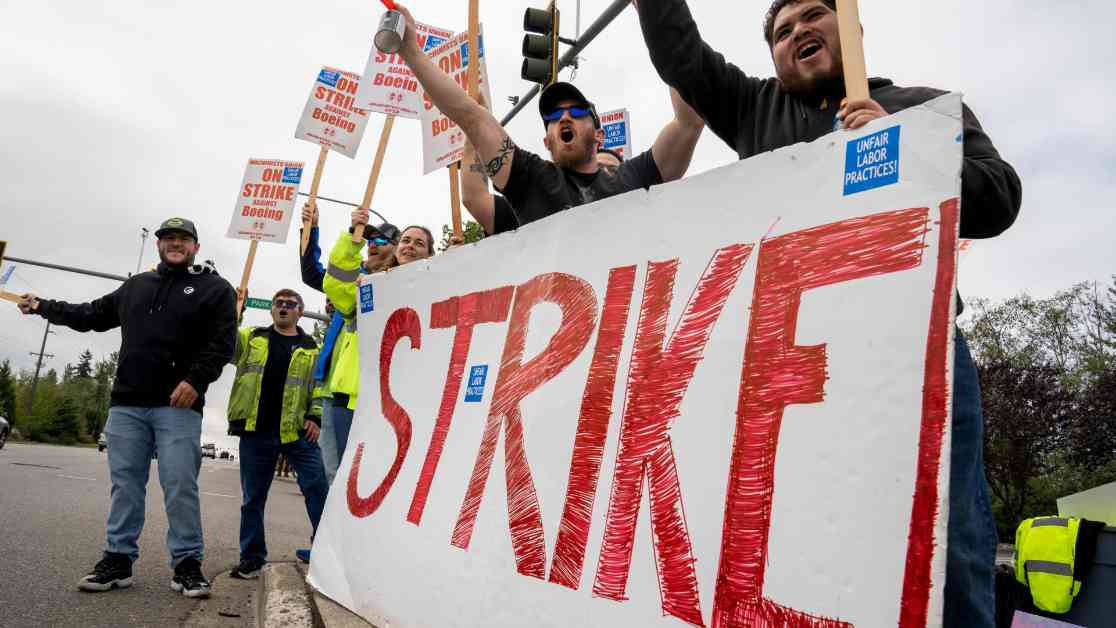Boeing Workers Rally as Strike Enters Second Week
The Boeing Portland Facility in Oregon was the site of a rallying cry on September 19, 2024, as striking Boeing workers gathered to push for better labor conditions. The strike, which has brought most of the aerospace giant’s aircraft production to a standstill, has seen more than 30,000 machinists demanding fair treatment and improved wages.
Boeing made a significant move on Monday by presenting a revised contract offer, stating that it was their “best and final” proposal to the workers. The new offer included a 30% increase in general wages over four years, up from the initial 25% proposal. Additionally, Boeing doubled the ratification bonus to $6,000, reinstated an annual machinist bonus, and raised the company’s 401(k) match.
However, the International Association of Machinists and Aerospace Workers District 751, the union representing the workers, was quick to criticize the offer. They claimed that Boeing did not engage in negotiations before presenting the new proposal, calling it an attempt to bypass the union’s input. The union expressed disappointment with the lack of discussion surrounding the offer, stating that it was “thrown at us without any discussion.”
The union also raised concerns about the tight deadline imposed by Boeing, which required ratification by Friday at 11:59 p.m. PT. The union argued that this timeline did not allow enough time to present the details of the offer to members or secure all voting locations. As a result, they announced that they would not be voting on the proposed offer on the specified date.
Despite their decision not to vote immediately, the union pledged to survey its members to gather their opinions on whether Boeing’s new offer met their demands. The union emphasized the importance of seeking feedback from the workers before making a decision on the contract.
The strike has put pressure on Boeing’s new CEO, Kelly Ortberg, to reach a resolution as the company faces significant financial losses. Analysts estimated that the strike was costing Boeing $50 million a day, leading to concerns about a potential credit downgrade if the strike persisted. In response to the strike, Boeing implemented cost-cutting measures such as temporary furloughs for nonunion workers, a hiring freeze, reduced travel, and the elimination of first- and business-class air tickets for employees.
Negotiations between Boeing and the union have been challenging, with both parties expressing disappointment with the progress made last week. The strike was prompted by the workers’ overwhelming rejection of the previous contract proposal, which the union had initially endorsed. Workers cited the need for higher wages to keep up with the rising cost of living in the Seattle area as a key factor in their decision to reject the initial offer.
As the strike continues, workers have begun to make preparations for a potentially prolonged period without work. Some have taken on side jobs such as delivering food or working in warehouses to supplement their income during the strike. The determination and solidarity of the workers on the picket lines reflect their commitment to achieving fair treatment and better working conditions from Boeing.
Impact on Boeing and Workers
The ongoing strike at Boeing has had significant implications for both the company and its workers. With production halted and financial losses mounting, Boeing is under pressure to resolve the labor dispute and resume operations. The strike has highlighted the importance of fair wages and working conditions for the thousands of machinists who play a crucial role in the aerospace industry.
The workers, on the other hand, are facing uncertainty and financial challenges as the strike continues. Many have expressed frustration with the lack of progress in negotiations and the impact of the strike on their livelihoods. The decision to reject the initial contract proposal reflects their determination to secure a fair deal that meets their needs and addresses their concerns.
Challenges and Opportunities for Resolution
The labor dispute between Boeing and its workers presents both challenges and opportunities for resolution. The company’s revised contract offer, while an improvement from the initial proposal, has faced criticism from the union for its lack of negotiation and tight deadline. The union’s decision to survey its members indicates a willingness to engage in dialogue and seek input from the workers before reaching a decision on the contract.
Moving forward, both Boeing and the union will need to find common ground and address the key issues that have led to the strike. Fair wages, working conditions, and benefits are critical factors that must be addressed in any potential agreement. The willingness of both parties to negotiate in good faith and consider the needs of the workers will be essential in reaching a resolution that is fair and equitable for all involved.
Looking Ahead
As the strike at Boeing continues, the focus remains on finding a resolution that addresses the concerns of the workers and allows the company to resume operations. The determination and solidarity of the workers on the picket lines demonstrate their commitment to securing fair treatment and improved conditions from Boeing. Negotiations between the company and the union will play a crucial role in determining the outcome of the labor dispute and shaping the future of the aerospace industry.

















